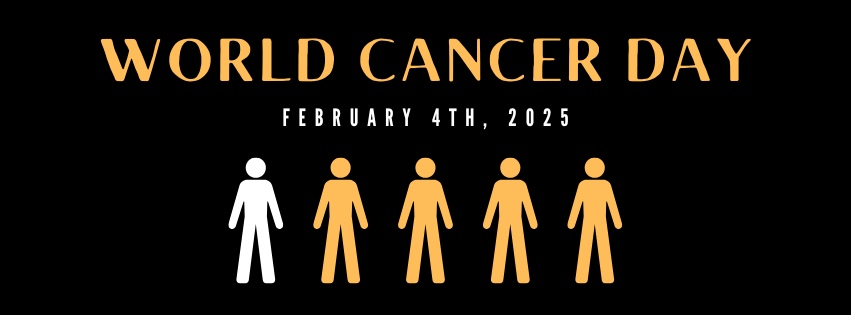By Ashley Parde and Caroline Stokes – second-year genetic counseling students
According to the 2024 World Health Organization’s global cancer statistics, approximately one in five people will develop cancer in their lifetime. February 4th is globally recognized as World Cancer Day. The goal of World Cancer Day is to raise international awareness and reduce illness and death caused by cancer by encouraging the prevention, detection, and treatment of cancer. The day is coordinated by the Union for International Cancer Control (UICC) and aims to highlight the growing global cancer burden.
The theme is “United by Unique,” which places people at the center of cancer care and emphasizes the importance of compassionate, personalized approaches to cancer. World Cancer Day aims to reduce cancer risk factors, improve access to care, and ultimately save lives.
Screening Matters: Catching Cancer Early
Cancer screening is a vital tool for detecting cancer in its earliest stages when it is often more treatable. It is important to discuss your unique health history and risk factors with your medical provider to figure out screening plans that are right for you. Lifestyle habits, family history, and other factors all influence an individual’s personal risk of developing cancer.
When should you start screening for cancer? Here are general guidelines for when to begin routine cancer screenings:
- Breast cancer: Mammograms starting at age 40.
- Cervical cancer: Pap smears starting at age 25.
- Colorectal cancer: Colonoscopies or other methods starting at age 45.
- Prostate cancer: Screening at 45 for Black/African American individuals and age 50 for individuals who are not Black/African American.
- Lung cancer: Screening at 50 for those with a history of smoking.
Routine cancer screening is designed for individuals at an average risk of developing cancer, but some individuals may need to begin screening earlier or even undergo more testing. For example, a woman with a strong family history of breast cancer might screen before the recommended age of 40. It is important to discuss this with your health care provider, as they can help decide the right screenings and when to begin them.
While routine screening is crucial for early detection, it is only one piece of the puzzle. Certain patterns or conditions in your family history may point to a higher risk for hereditary cancer syndromes, making genetic testing an important consideration. Knowing what to look for in your family history can help you and your loved ones make informed decisions about cancer prevention.
When to Consider Genetic Testing
Genetic testing can look for certain hereditary cancer conditions, ones that an individual is born with. These genetic changes put the person at an increased risk of developing certain kinds of cancer. Genetic testing may guide next steps on how to prevent or detect cancer earlier.
Not everyone needs genetic testing. Individuals with the following personal or family history information would be offered genetic testing:
- Multiple cancer types in one person: An individual has been diagnosed with multiple types of cancer over their lifetime.
- Early cancer diagnoses: Diagnoses such as triple-negative breast cancer, ovarian cancer, pancreatic cancer, or colorectal cancer before age 50.
- Rare or atypical cancers: Uncommon cancers for a person’s age or sex, such as male breast cancer.
- Bilateral cancer: Cancer affecting both paired organs, such as both breasts or both kidneys.
- Family History:
- Several family members with the same type of cancer.
- Multiple family members diagnosed with cancer at an early age.
- Cancer clustering on one side of the family, such as many relatives on either parent’s side of the family with the same type of cancer.
- Known genetic changes If family members are known to carry an inherited cancer-related change (called a variant), testing may be necessary to figure out your own chances.
- Racial or ethnic background: Being part of a group with a higher prevalence of certain inherited cancer syndrome may call for testing.
If anything on this list stands out, you should talk to your primary care provider or a genetic counselor.
The Role of Genetic Counseling in Cancer Care
Genetic counselors who specialize in cancer genetics gather and interpret personal and family history information to determine if individuals may be at risk for hereditary cancer conditions that put them at an increased risk of developing certain kinds of cancer. Genetic counselors work with oncologists and other healthcare professionals to guide tailored care strategies.
Genetic counselors support individuals and their families to make informed decisions about their health. If you think you or someone you love might be at risk for hereditary cancer, talk with your medical provider or visit findageneticcounselor.org to connect with a genetic counselor in your area.
Resources
Learn more about World Cancer Day and the UICC
Find a genetic counselor near you who specializes in hereditary cancer.
Information about the global cancer burden from the World Health organization.
Visit the CDC for cancer screening test information and recommendations.
More information about the genetics of cancer, including hereditary cancer conditions.
References
Cancer Screening | Resources and FAQ. (2025). Cancer.org.
Genetic Testing for Cancer Risk: Types, Pros & Cons. (2022, August 8). Cleveland Clinic.
National Cancer Institute. (2024, April 18). Genetic Testing for Hereditary Cancer Syndromes. National Cancer Institute; Cancer.gov.
